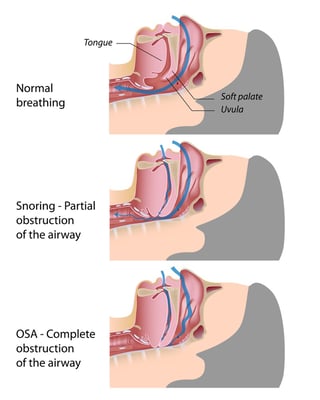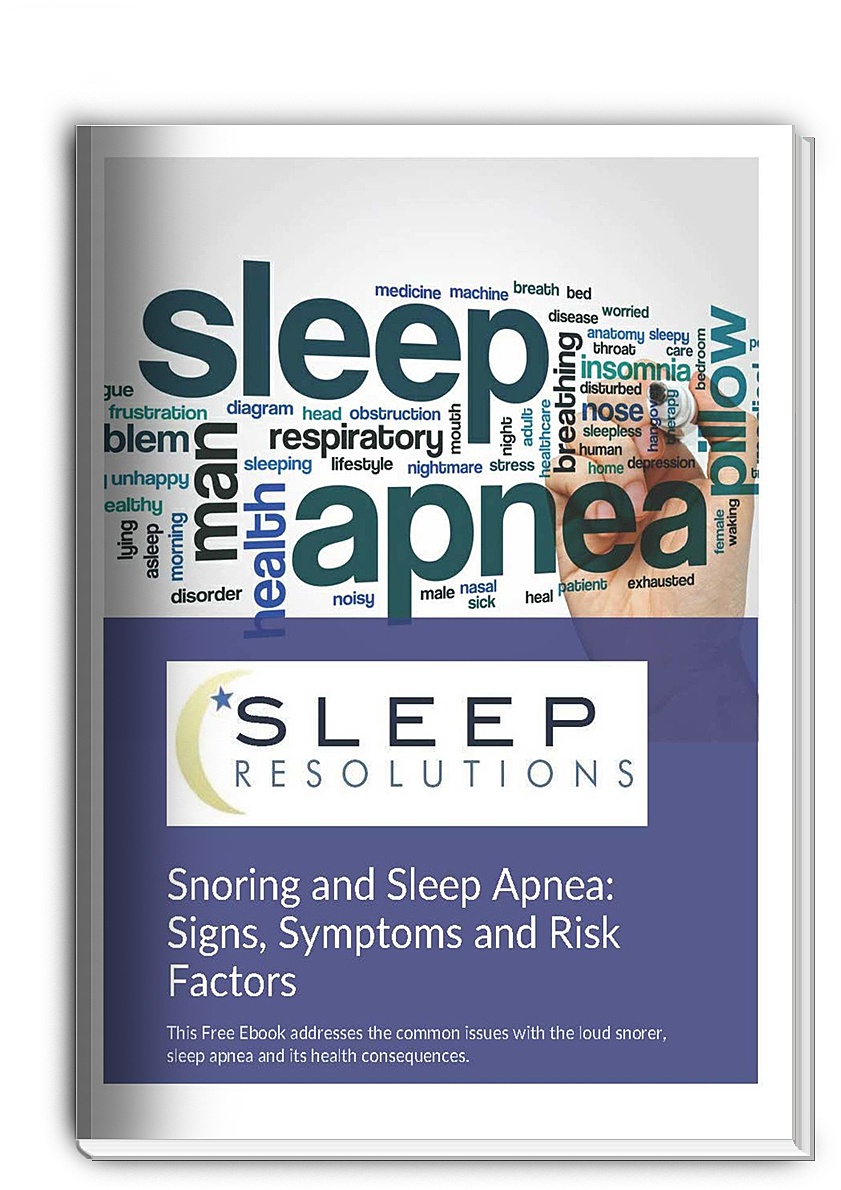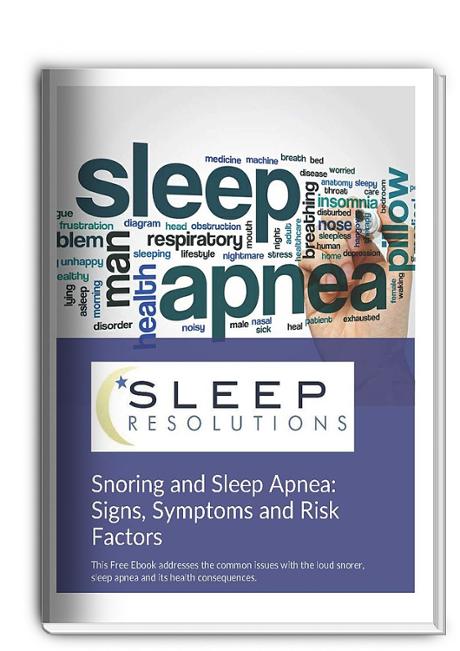
The best relationships are often marked by excellent communications. Partners who are lucky enough to be able to talk, easily and openly, about any and all relationship problems are generally couples that may look forward to enjoying a happy life together.
But how can you talk about a problem when your partner is always fast asleep when you need to talk about it?
Snoring is a Two-Person Problem
Coping with a snoring bed partner has likely been an issue from the very first days of humankind. The primitive physical methods to handle a sleeping snorer are still used today: staring with nudging and whispering “you’re snoring,” it quickly progresses to pushing, yelling, and slapping, and eventually leads to the frustrated flight of the sleepless partner to an uncomfortable night on the couch, or the banishment of the snorer to the bathtub – with the bathroom door tightly closed.
All levity aside, snoring is a very real problem. Typical snores range from 60 decibels — the volume of a normal conversation — to as high as 90 or 100 decibels, which is literally as loud as a chainsaw.
What makes snoring a particularly difficult problem is that snoring, unlike most relationship issues, is entirely out of both people’s conscious control. So how can the situation be handled successfully?
It is important to understand that this is a two-person problem, both the sleeper and the snorer. Understanding each other’s perspectives will be helpful in finding a solution for both people.
What Causes Snoring?
Snoring, in general, occurs when air causes vibration of soft tissues in the nose, mouth, and throat. Although some snoring may be caused by allergies, blocked nasal passages, excess weight, or sleep position, the noises may occur simply because the organs and tissues in your throat are set up to do so.
It may be completely natural and normal for you to snore. Perhaps you have a narrow throat, or a loose epiglottis, or an oversized soft palate: all within the norm, but in combination, a perfect storm for snores.
In some cases, surgical removal of structures such as the uvula, tonsils, and adenoids can stop snoring. But in other people there remain plenty of essential soft tissues in the oral/respiratory tract, such as the tongue and the lining of the throat itself, that can still rattle and rasp.
Those who snore excessively loudly may also suffer from a condition known as obstructive sleep apnea (OSA). One or more of the structures in the nose and throat may actually block the trachea (windpipe) in mid-snore, cutting off one’s air supply and stopping them from breathing, often as many as 100 times each minute. For every occurrence, the body tries to wake the sleeper, at least long enough to gasp and reopen the airway. As a result, apnea sufferers rarely experience deep, restful sleep – and their partners are frightened by yet another loud, sleep-breaking noise from their companion.
No matter what the physical cause of a person’s snoring, it is completely outside of conscious control. Someone who snores cannot simply stop snoring through force of will.
Understanding the Snorer’s Perspective
No matter how loudly a person may snore, it is entirely possible that they have no idea they are doing it. After all, they are fast asleep, and cannot hear themselves. Even when a person knows of their snoring, they may have no idea of the effect it has on others.
The first time one learns that they snore loudly will likely be in a negative way: “You kept me up all night with your snoring!” But when loved ones complain about your snoring, even in the most delicate of terms, it may feel like an unfair criticism to the snorer. Ongoing complaints may lead to feelings of humiliation, shame, embarrassment, and guilt, despite there being no malicious intent whatsoever on the part of the snoring half of the couple.
In the worst-case scenarios, an unfortunate, un-sleeping partner may be unable to get any sleep for days, weeks, or even months. The snoring partner may watch as their other half suffers from moodiness, impatience, and even hallucinations through lack of sleep – and still feel totally helpless, due to their inability to stop their own snoring.
In addition, those also suffering from sleep apnea are sleeping just as badly as their non-snoring partner.
Understanding the Non-Snorer’s Perspective
To a non-snorer, especially light sleepers, a loudly snoring bed partner can be an ongoing nightmare. With literally every breath, they are jolted awake. A night of continuously-interrupted sleep could make one feel as if they are being tortured. (In fact, sleep deprivation has historically been among the most effective torture techniques ever devised.)
The daily consequences of sleeplessness are very real, and can be very serious. Stress, exhaustion, loss of alertness, daytime sleepiness, and inability to concentrate are just some of the symptoms.
All aspects of daily life are adversely affected when one is unable to sleep through the night, including performance at work, interpersonal relationships, and one’s own personal happiness. And we’re not even talking about personal safety: driving-while-sleepy has been shown to result in far more accidents than driving while intoxicated.
Add onto all of this the continual frustration of watching one’s snoring bed partner wake each morning, rested, refreshed (relatively, anyway), and utterly clueless about what they are putting their partner through, and you have the makings of a potentially disastrous relationship problem.
Communication to Solve the Snoring Situation

As stated at the start, the most successful couples often enjoy excellent communication. However, when both sides are dealing with sleep deprivation, it can be challenging to find any time or desire to talk, let alone to find common ground. Here are some suggestions to give you the best chance of success:
-
Talk when you are both as rested as possible.
-
Avoid talking talk in the middle of the night, first thing in the morning, or right before bed.
-
Keep each other’s perspectives in mind: both of you have legitimate concerns, but neither is trying to hurt each other.
-
Remember that snoring is a physical issue, not an emotional one, and can be addressed without judgment or prejudice.
- Confirm that you both care for each other, and take each other's concerns seriously.
Technical Cures for Snoring
Remember the primitive methods for dealing with a loudly snoring sleep partner? Poking, slapping, yelling, etc.? They are, at best, a short-term solution. (How often have you woken your partner to demand they stop snoring, only to hear it resume within seconds?)
Fortunately, the science of sleep study has evolved to provide excellent alternatives to middle-of-the-night physical altercations. You may be required to undergo a formal sleep study to take advantage of some specialized medical equipment, but these are often covered by insurance.
- The CPAP (Continuous Positive Airway Pressure) machine is the single most effective device for treating
 sleep apnea, and for stopping snoring. Available in a range of designs for comfort and personal preference, a CPAP uses pressurized air to keep the entire airway open continuously during sleep. The vibrating throat tissues never have the chance to flop down; your airway is never blocked; and your body can experience deep, complete, uninterrupted sleep until your 80-decibel alarm clock rings in the morning.
sleep apnea, and for stopping snoring. Available in a range of designs for comfort and personal preference, a CPAP uses pressurized air to keep the entire airway open continuously during sleep. The vibrating throat tissues never have the chance to flop down; your airway is never blocked; and your body can experience deep, complete, uninterrupted sleep until your 80-decibel alarm clock rings in the morning.
- As snoring is a physical issue, it tends to be worst when one is lying flat on one’s back. The offending soft tissues in the throat are most likely to flap, vibrate, and shiver in that position, causing the loudest noises.
Some snoring beauties may quiet down if they elevate their upper bodies when sleeping. One or two pillows behind the back and neck could do the trick. (Don’t just elevate the head: that may create an even worse angle for those dangling tissues.) Even better, an adjustable bed can smoothly and comfortably tilt up the upper body, like a recliner, and alleviate the situation.
-
In dry climates, humidifiers may help to prevent drying out of the nasal and oral passages, and may prevent excessive snoring.
-
A ten-cent foam earplug may be all that is needed to restore peaceful sleep.
- Sound Machines/White Noise Generators. These have the ability to desensitize one’s hearing if it is run through the night. For some, a simple desk fan on a low setting can provide sufficient masking sound to drown out a moderately loud snorer.
Summary
When you're part of a couple, snoring is a shared nuisance – and addressing it is a shared responsibility. Fortunately, by keeping the lines of communication open and un-emotional, you can talk through this problem and find a practical solution that helps both the snorer and the bed partner.
Remember: snoring is likely to cause fragmented sleep for at least one partner and possibly both, if the snorer has an undiagnosed case of obstructive sleep apnea. If easy solutions like changing one's sleep position don't help, it's time to see your doctor or a sleep specialist.










Leave a comment